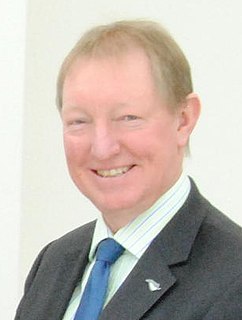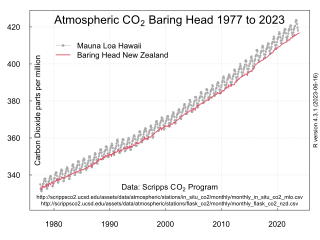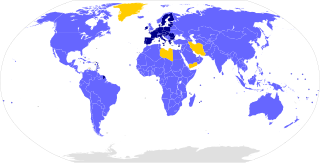
The Kyoto Protocol is an international treaty which extends the 1992 United Nations Framework Convention on Climate Change (UNFCCC) that commits state parties to reduce greenhouse gas emissions, based on the scientific consensus that (part one) global warming is occurring and (part two) it is extremely likely that human-made CO2 emissions have predominantly caused it. The Kyoto Protocol was adopted in Kyoto, Japan, on 11 December 1997 and entered into force on 16 February 2005. There are currently 192 parties (Canada withdrew from the protocol, effective December 2012) to the Protocol.
Carbon neutrality, or having a net zero carbon footprint, refers to achieving net zero carbon dioxide emissions by balancing carbon emissions with carbon removal or simply eliminating carbon emissions altogether. It is used in the context of carbon dioxide-releasing processes associated with transportation, energy production, agriculture and industrial processes. Carbon-neutral status can be achieved in two ways:

Nicolas Rex Smith is a New Zealand politician and a member of the New Zealand Parliament as a National Party member of parliament. Smith has represented the Nelson electorate since 1996, and was the Member for Tasman before that, from 1990–1996.

The Climate Change and Sustainable Energy Act 2006 is an Act of the Parliament of the United Kingdom which aims to boost the number of heat and electricity microgeneration installations in the United Kingdom, so helping to cut carbon emissions and reduce fuel poverty.

The Climate Change Act 2008 is an Act of the Parliament of the United Kingdom. The Act makes it the duty of the Secretary of State to ensure that the net UK carbon account for all six Kyoto greenhouse gases for the year 2050 is at least 80% lower than the 1990 baseline, toward avoiding dangerous climate change. The Act aims to enable the United Kingdom to become a low-carbon economy and gives ministers powers to introduce the measures necessary to achieve a range of greenhouse gas reduction targets. An independent Committee on Climate Change has been created under the Act to provide advice to UK Government on these targets and related policies. In the act Secretary of State refers to the Secretary of State for Energy and Climate Change.

The Committee on Climate Change (CCC) is an independent non-departmental public body, formed under the Climate Change Act (2008) to advise the United Kingdom and devolved Governments and Parliaments on tackling and preparing for climate change. The Committee provides advice on setting carbon budgets, and reports regularly to the Parliaments and Assemblies on the progress made in reducing greenhouse gas emissions. As of May 2019 not yet made into law, the CCC has recommended net zero greenhouse gas emissions by the United Kingdom by 2050 and the Energy and Climate Intelligence Unit (ECIU) has said it would be affordable. However some environmental groups, such as Extinction Rebellion, are calling for a more ambitious target.
The Fifth Labour Government of New Zealand was the government of New Zealand from 10 December 1999 to 19 November 2008. Labour Party leader Helen Clark negotiated a coalition with Jim Anderton, leader of the Alliance Party and later the Progressive Party, and New Zealand First. While undertaking a number of substantial reforms, it was not particularly radical compared to previous Labour governments.

Mitigation of global warming involves taking actions to reduce greenhouse gas emissions and to enhance sinks aimed at reducing the extent of global warming. This is in distinction to adaptation to global warming, which involves taking action to minimize the effects of global warming. Scientific consensus on global warming, together with the precautionary principle and the fear of non-linear climate transitions, is leading to increased effort to develop new technologies and sciences and carefully manage others in an attempt to mitigate global warming.

Climate change in New Zealand refers to historical changes in the climate of New Zealand and New Zealand's contribution to and response to global warming. In 2014, New Zealand contributed 0.17 per cent to the world's total greenhouse gas emissions. However, on a per capita basis, New Zealand is a significant emitter - the 21st highest contributor in the world and fifth highest within the OECD.

The New Zealand Emissions Trading Scheme is a partial-coverage all-free allocation uncapped highly internationally linked emissions trading scheme. The NZ ETS was first legislated in the Climate Change Response Amendment Act 2008 in September 2008 under the Fifth Labour Government of New Zealand and then amended in November 2009 and in November 2012 by the Fifth National Government of New Zealand.
The Climate Change Response Amendment Act 2008 was a statute enacted in September 2008 by the Fifth Labour Government of New Zealand that established the first version of the New Zealand Emissions Trading Scheme, a national all-sectors all-greenhouse gases uncapped and highly internationally linked emissions trading scheme.
The Emissions Trading Scheme Review Committee was a special committee of the New Zealand Parliament which conducted a review of the Fifth Labour Government's Emissions Trading Scheme between December 2008 and late August 2009.
Intended Nationally Determined Contributions (INDCs) is a term used under the United Nations Framework Convention on Climate Change (UNFCCC) for reductions in greenhouse gas emissions that all countries that signed the UNFCCC were asked to publish at the 2013 United Nations Climate Change Conference held in Warsaw, Poland, in November 2013. The intended contributions were determined without prejudice to the legal nature of the contributions. The term was intended as a compromise between "quantified emissions limitation and reduction objective" (QUELROs) and "nationally appropriate mitigation actions" (NAMAs) that the Kyoto Protocol used to describe the different legal obligations of developed and developing countries. Under the Paris Agreement, adopted in December 2015, the INDC will become the first Nationally Determined Contribution (NDC) when a country ratifies the agreement unless it decides to submit a new NDC at the same time. Once the Paris Agreement is ratified, the NDC will become the first greenhouse gas targets under the UNFCCC that applied equally to both developed and developing countries. On 3 August 2016, China and the US ratified the agreement. Together, they both constitute 38% of total global emission, with China alone emitting 20%. India, with 4.1% of emissions, ratified the Paris Agreement on October 2, 2016 by depositing the instrument of ratification with the United Nations.

The California Global Warming Solutions Act of 2006: emissions limit, or SB-32, is a California Senate bill expanding upon AB-32 to reduce greenhouse gas (GHG) emissions. The lead author is Senator Fran Pavley and the principal co-author is Assemblymember Eduardo Garcia. SB-32 was signed into law on September 8, 2016, by Governor Edmund Gerald “Jerry” Brown Jr. SB-32 sets into law the mandated reduction target in GHG emissions as written into Executive Order B-30-15.
The Interim Climate Change Committee is a ministerial advisory committee created by the New Zealand Government in mid–April 2018 to explore how New Zealand transitions to a net zero emissions economy by 2050. The Interim Committee will be superseded and replaced by an independent Climate Change Commission under the Climate Change Response Amendment Bill in May 2019.

The Special Report on Global Warming of 1.5 °C (SR15) was published by the Intergovernmental Panel on Climate Change (IPCC) on 8 October 2018. The report, approved in Incheon, South Korea, includes over 6,000 scientific references, and was prepared by 91 authors from 40 countries. In December 2015, the 2015 United Nations Climate Change Conference called for the report. The report was delivered at the United Nations' 48th session of the IPCC to "deliver the authoritative, scientific guide for governments" to deal with climate change.
Carbon pricing in Canada is implemented either as a regulatory fee or tax levied on the carbon content of fuels at the Canadian provincial, territorial or federal level. Provinces and territories of Canada are allowed to create their own system of carbon pricing based on the needs and requirements of their own jurisdictions. In the absence of a provincial system, the federal Greenhouse Gas Pollution Pricing Act (GHGPPA), which passed in December 2018, implements a regulatory fee which applies only to provinces and territories whose carbon pricing system does not meet federal requirements. In provinces where the fee is levied, 90% of the revenues are returned to tax-payers. The carbon tax is levied because of a perceived need to combat climate change, which resulted in Federal commitments to the Paris Agreement. The air today contains 400 ppm of CO2 while paleoscientists from NASA have found that the CO2 level average over the past 400,000 years was between 200 ppm and 280 ppm.















